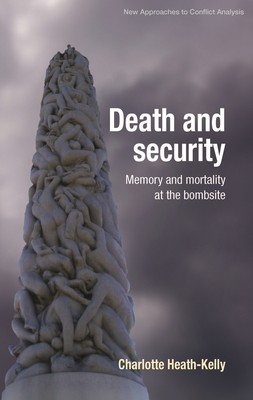
- We will send in 10–14 business days.
- Author: Charlotte Heath-Kelly
- Publisher: Manchester University Press
- Year: 2016
- Pages: 208
- ISBN-10: 1784993131
- ISBN-13: 9781784993139
- Format: 15.6 x 23.4 x 1.3 cm, kieti viršeliai
- Language: English
- SAVE -10% with code: EXTRA
Reviews
Description
Making a bold intervention into critical security studies literature, this book explores the ontological relationship between mortality and security. It considers the mortality theories of Heidegger and Bauman alongside literature from the sociology of death, before undertaking a comparative exploration of the memorialisation of four prominent post-terrorist sites: the World Trade Centre in New York, the Bali bombsite, the London bombings and the Norwegian sites attacked by Anders Breivik. By interviewing the architects and designers of these reconstruction projects, the book shows that practices of memorialisation are a retrospective security endeavour - they conceal and re-narrate the traumatic incursion of death. Disaster recovery is replete with security practices that return mortality to its sublimated position and remove the disruption posed by mortality to political authority. The book will be of significant interest to academics and postgraduates working in the fields of
critical security studies, memory studies and international politics.
EXTRA 10 % discount with code: EXTRA
The promotion ends in 22d.02:23:43
The discount code is valid when purchasing from 10 €. Discounts do not stack.
- Author: Charlotte Heath-Kelly
- Publisher: Manchester University Press
- Year: 2016
- Pages: 208
- ISBN-10: 1784993131
- ISBN-13: 9781784993139
- Format: 15.6 x 23.4 x 1.3 cm, kieti viršeliai
- Language: English English
Making a bold intervention into critical security studies literature, this book explores the ontological relationship between mortality and security. It considers the mortality theories of Heidegger and Bauman alongside literature from the sociology of death, before undertaking a comparative exploration of the memorialisation of four prominent post-terrorist sites: the World Trade Centre in New York, the Bali bombsite, the London bombings and the Norwegian sites attacked by Anders Breivik. By interviewing the architects and designers of these reconstruction projects, the book shows that practices of memorialisation are a retrospective security endeavour - they conceal and re-narrate the traumatic incursion of death. Disaster recovery is replete with security practices that return mortality to its sublimated position and remove the disruption posed by mortality to political authority. The book will be of significant interest to academics and postgraduates working in the fields of
critical security studies, memory studies and international politics.


Reviews